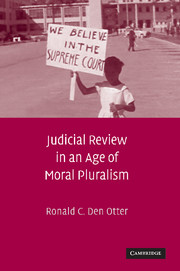Book contents
- Frontmatter
- Contents
- Acknowledgments
- Introduction
- 1 Public Justification and Constitutional Theory
- 2 Freedom and Equality in Constitutional History
- 3 The Challenge of Public Justification
- 4 Competing Conceptions of Public Reason
- 5 Constitutional Public Reason
- 6 The Limits of Public Justification
- 7 Standard Objections to Public Reason
- 8 Easier Cases
- 9 Harder Cases
- 10 The Case for Judicial Review
- Conclusion
- References
- Index
- References
7 - Standard Objections to Public Reason
Published online by Cambridge University Press: 17 December 2010
- Frontmatter
- Contents
- Acknowledgments
- Introduction
- 1 Public Justification and Constitutional Theory
- 2 Freedom and Equality in Constitutional History
- 3 The Challenge of Public Justification
- 4 Competing Conceptions of Public Reason
- 5 Constitutional Public Reason
- 6 The Limits of Public Justification
- 7 Standard Objections to Public Reason
- 8 Easier Cases
- 9 Harder Cases
- 10 The Case for Judicial Review
- Conclusion
- References
- Index
- References
Summary
In the first part of this chapter, I defend public reason against a number of well-known objections and then try to explain its appeal in a society like our own. An ideal of public justification cannot be too controversial if it is to serve as the mode of public reasoning that will help us to resolve constitutional disputes as fairly as possible. Those who are reasonable but have different conceptions of good must use the same principle of public reason when they exchange reasons with one another to narrow the range of their initial disagreement. I shall show that none of these objections is compelling and that some of them rest on misconceptions about the nature of Rawlsian public reason.
In doing so, I deviate from Rawls's own view by insisting that people who are not judges should not feel obligated to limit themselves to public reasons when they deliberate and vote on the most important political questions. Public deliberation should be as participatory and open ended as possible to enable everyone to express their sentiments and articulate their deepest convictions. My position is distinct, then, from that of Rawls, who believes that citizens and public officials should have a self-imposed duty to limit themselves to sufficiently public reasons in certain circumstances. Instead, I believe that judges should limit themselves and others to public reasons when they exercise the power of judicial review.
Information
- Type
- Chapter
- Information
- Judicial Review in an Age of Moral Pluralism , pp. 200 - 230Publisher: Cambridge University PressPrint publication year: 2009
